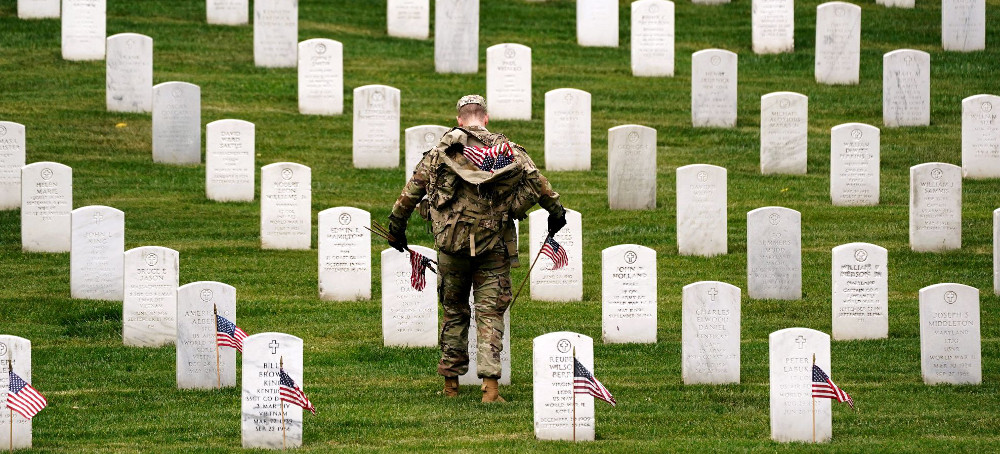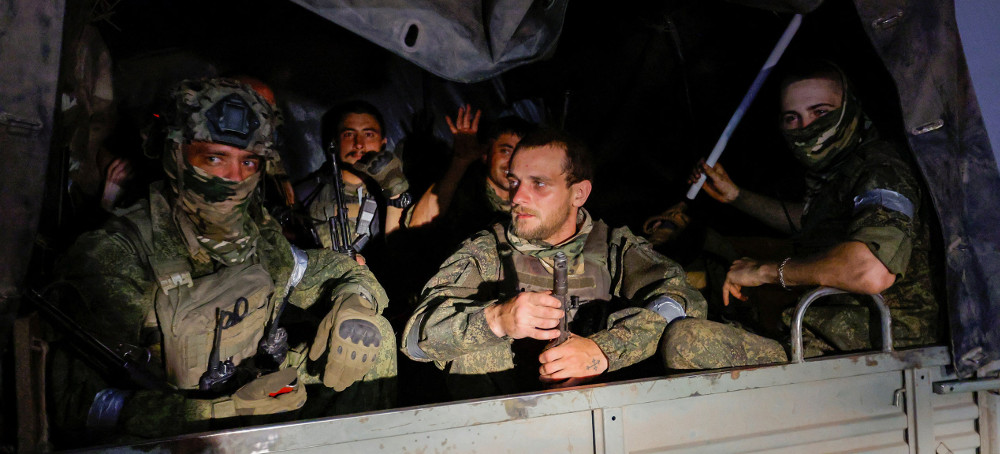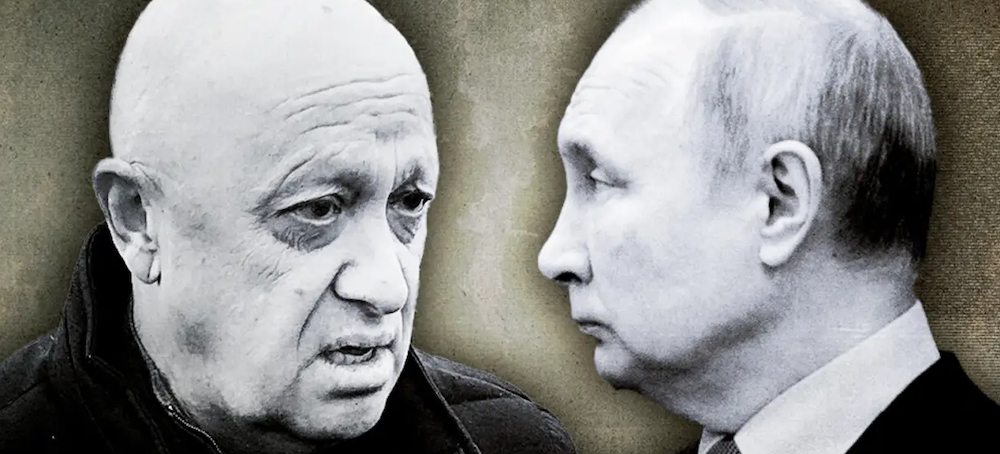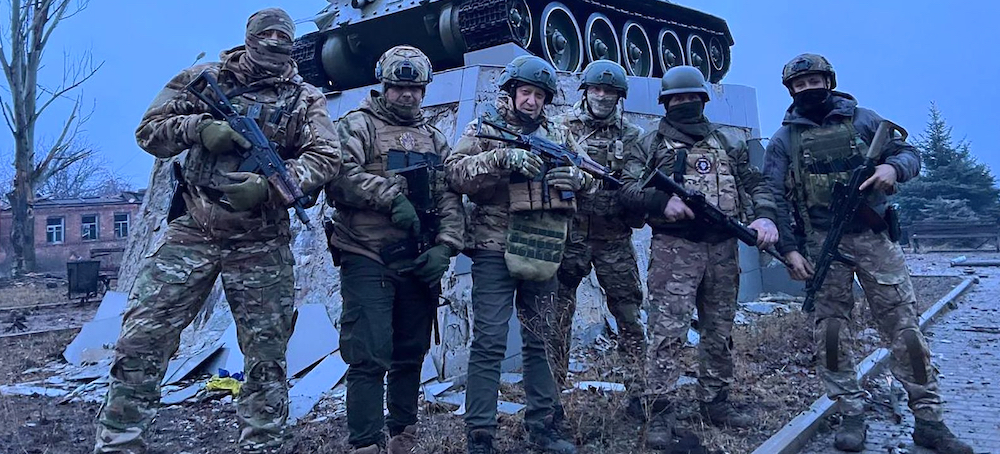This weekend, the country saw someone other than Putin act politically and—even more important—wield force.
Masha Gessen
/
The New Yorker
What happened in Russia over the weekend? It began
as a mutiny within the armed forces, continued as what looked like a
mafia sit-down, seemed briefly to transform into a coup, then ended
abruptly the way that a hostage-taking may end, with the terrorist given
safe passage, immunity from prosecution, and a bunch of promises.
Stage 1: Mutiny. It had been brewing for months. All through the winter and spring, Yevgeny Prigozhin, whose private army, the Wagner Group,
was fighting the Ukrainian military for control of the Ukrainian city
of Bakhmut, had been accusing the Russian Defense Ministry of sabotaging
his actions and failing to supply enough armaments. Prigozhin and his
men—many of them convicted felons conscripted from prison colonies, an
approach he didn’t invent but was the first to apply during this
war—alternated between being plaintive and menacing. They threatened to
abandon Bakhmut. On social media, they hurled insults at military brass,
including the Minister of Defense, Sergei Shoigu, and the chief of the
general staff, Valery Gerasimov.
In response, the Ministry of Defense, Russia’s official,
taxpayer-funded Army, which has been fighting alongside Prigozhin’s
private force, apparently moved to limit Prigozhin’s power. For months
the Ministry of Defense has reportedly been drafting from prison
colonies, appropriating Prigozhin’s know-how and presumably cutting off
his supply of able-bodied men with nothing to lose.
In mid-June, the
state military tried to put its house in order by requiring all fighters
to sign identical contracts with the Ministry of Defense. It wasn’t
clear if the measure applied to the Wagner Group—if it did, Prigozhin
could effectively lose control of his army. On June 23rd, Prigozhin
accused the Ministry of Defense of striking his bases and, in a series
of statements, declared an armed rebellion. “The evil being wrought by
the military leadership of this country must be stopped,” he said.
“Justice in the ranks of the military will be restored—and then justice
for all of Russia.” His men crossed the border from Ukraine into Russia.
He claimed that they numbered twenty-five thousand. “This is not a
military coup,” he said. “This is a march for justice.”
Prigozhin was not challenging Putin. In fact, he was acting in
accordance with the power structure and the mythology constructed by
Putin, whereby Putin alone makes all the decisions and, if those
decisions are bad, then it’s someone else’s fault—it means that he was
misinformed. In a video released on June 23rd, Prigozhin said that war
in Ukraine had been unleashed under false pretenses—because, he said,
the Ministry of Defense had lied to Putin, making him think that Ukraine
and NATO were about to attack Russia. Prigozhin was apparently marching to the capital not to depose Putin but to enlighten him.
Stage 2: The Sit-Down. Prigozhin’s men and their tanks entered
Rostov-on-Don, a city of more than a million people and the seat of
Russia’s Southern Military District. There Prigozhin talked, over what
appeared to be tea, in what appeared to be the courtyard of a military
building, with the Deputy Minister of Defense, Yunus-Bek Yevkurov, and a
deputy chief of the general staff, Vladimir Alekseyev. The genesis of
the meeting was unclear. Had the two generals flown in to speak with
Prigozhin? If so, this was a negotiation. Were they in Rostov when
Prigozhin’s men occupied the city? That would make them more like
hostages and less like negotiators. Prigozhin sat, manspreading, on a
narrow bench, his Kalashnikov dangling against his right knee as he used
both hands to gesticulate. “We want the chief of the general staff and
Shoigu,” he said. “Until they are handed over to us, we will stay here
and blockade the city.”
“Take them,” Alekseyev said, smiling and spreading his arms wide, as
though waving Shoigu and Gerasimov away. He seemed to have as little
regard for Shoigu as did Prigozhin. This is not surprising. Shoigu did
not come up through the ranks of the military. In the Soviet Union, he
was a Party functionary. In post-Soviet Russia, he became the Minister
of Emergency Situations. What primarily qualified him for the job of
Minister of Defense, which he has occupied since 2012, was a sort of
adventurous friendship with Putin: the two camped together and hiked
together and ran the Russian Geographic Society together, Shoigu as
president and Putin as chairman of the board.
Stage 3: The Coup. Prigozhin’s men began their march toward Moscow.
Along the way—perhaps even before entering Rostov—the Wagner Group shot
down some number of Russian military aircraft. Now Prigozhin’s mutiny
was looking like a coup—not because Prigozhin was challenging Putin
directly but because he was fighting Putin’s actual Army. In the morning
on the second day of Prigozhin’s insurgency, Putin addressed the
nation. He compared the “armed rebellion,” as he called it, to the
revolutions of 1917, which, he claimed, cost Russia its victory in the
First World War and caused it to lose vast territories. He did not name
Prigozhin, referring, rather, to “organizers of the armed rebellion,”
whom he called traitors. He vowed to punish them, and to defend Russia.
Several Russian regions declared states of emergency or introduced
various restrictions. The mayor of Moscow gave the city a day off on
Monday. (It was still only Saturday at this point.) The Russian capital
prepared for battle. Putin’s plane left Moscow and disappeared from the
radar. Prigozhin had to face that, rather than speak to Putin, he would
likely die when he attempted to enter Moscow—because, whatever he had
intended, he had ended up attempting a coup.
Stage 4: It Ends the Way a Hostage-Taking Might. On Saturday evening,
about thirty-six hours after the mutiny began, the Belarusian dictator
Alexander Lukashenka’s press service announced that he had negotiated an
end to the crisis. Prigozhin’s people would reverse course. Prigozhin
would go to Belarus. Putin’s press secretary, Dmitry Peskov, said that
all criminal cases against Prigozhin had been closed. Lukashenka’s press
statement said that the agreement was mutually beneficial.
Rumors swirled that Lukasheka, empowered by Putin, had promised
Prigozhin Shoigu’s head on a platter. There is no way to know if this is
true, or if Putin had any intention to keep whatever promises
Lukashenka doled out, but one of several impossible dilemmas that Putin
is facing now is, indeed, what to do with Shoigu. He can hardly afford
to keep a Defense Minister who allowed all of this to happen—the public
spats, the mutiny, the siege of what is arguably the country’s most
important military city, the apparent failure to stop Prigozhin’s
armored column, and, most of all, the disrespect evident during
Prigozhin’s sit-down with the military brass.
On June 26th, Prigozhin
issued a ten-minute audio statement on the mutiny. He stressed that his
troops were able to incapacitate all Defense Ministry troops along the
route of the “march for justice.” He added that in twenty-four hours,
the Wagner Group covered the equivalent of the distance from Ukraine’s
eastern border to its western one, saying, “If the Special Military
Operation had been undertaken by troops as well trained and disciplined,
it could have lasted a day.”
Putin may be similarly stuck on the issue of Prigozhin himself. The
Wagner Group may or may not be essential to the Russian effort in
Ukraine, especially during the ongoing Ukrainian counter-offensive. But,
even if Putin doesn’t need Prigozhin on the battlefield, he must decide
what to do about him. The conceit that Prigozhin is going into exile in
Belarus is absurd, mostly because this wouldn’t be exile. With charges
against Prigozhin dropped, he is functionally free to return to Russia
(in contrast to anti-Putin activists and independent journalists, many of whom are forced to stay in exile
for fear of being arrested in Russia).
Belarus, the junior member of
the Russian-Belarusian “Union State,” is not exactly a sovereign state.
The border between the two countries is functionally open. Lukashenka
depends on Putin to help in his continuous crackdowns to prop up the
Belarusian regime. Lukashenka was once fickle, playing Russia against
Western European countries, but, ever since Putin helped Lukashenka put
down pro-democracy protests in 2020, Lukashenka has stayed in line.
Having the head of a large private army live in Belarus should seem to
Putin like an extremely risky proposition. What if Lukashenka replaces
Putin’s muscle with Prigozhin’s?
Historically, among Russian élites, Putin has followed the rule to
keep your friends close and your enemies closer. No one leaves this
mafia family intact. Putin has the option, and perhaps the instinct, to
bring Prigozhin back into the fold (and out of Belarus). That should be
easy, since Prigozhin never actually wanted to leave the fold. In his
June 26th statement, Prigozhin reiterated that he had no desire to bring
down the government. Putin addressed the nation later that day,
promising to deal decisively with those who inspired the mutiny that
threatened the country. But he chose to frame the rebellion as a kind of
terrorist attack, blaming it on neo-Nazis in Kyiv and unnamed enemies
in the West, vowing never to cave in to blackmail, and praising Russian
national unity.
He did not mention Prigozhin by name and, indeed,
praised Wagner fighters as brave patriots, and invited them to join the
regular Ministry of Defense forces. This invitation back into Putin’s
good graces does not necessarily exclude Prigozhin himself. A return to
Putin’s circle would probably require Prigozhin to appear on television
and express contrition for going a bit overboard in his conflict with
Shoigu. Absurd as this prospect may seem, what with the siege of Rostov
and the destroyed aircraft and their dead pilots, it falls within the
bounds of the imaginable for Russian propaganda.
What would the Russian people think of this? In general, the Putin
regime, like all totalitarian regimes, aims to prevent people from
thinking. But this past weekend Russians—not just the Russians who
consume independent media but all Russians who watch any TV or read or
watch anything online—saw something extraordinary. They saw real
political conflict. They saw someone other than Putin act politically
and—even more important—wield force. Can all the propagandists and
censors make them unsee it? They will try. Russians should probably gear
up for an extreme information crackdown.
Will Russians then forget what happened? Some things that shocked
Western observers, such as Prigozhin’s statement that the war in Ukraine
was started under false pretenses, will probably easily vanish from
consciousness. The specifics of what he said matter little. What’s
important is that he tapped into a reservoir of bitter suspicion:
Russians always suspect that they are being lied to, yet they have no
choice but to support those who lie to them. Prigozhin gave them a
choice, by driving tanks through the streets of Rostov.
If Putin’s regime ends before Putin dies, that end will look much
like the events of this past weekend: sudden, bloody, and ridiculous at
first. Most coups seem absurd at the beginning. Every coup is a
confidence game. The ultimate question is: How many people will believe
that Person A, not Person B, has power? Prigozhin’s gambit wasn’t
intended as a coup, but it functioned as one. Regular military forces
didn’t stop him, and indeed the defense officials negotiated with him,
because they apparently believed that he had power. Not the power to
bring down Putin but the power to influence Putin. They were not wrong.
Putin greeted the mutiny by calling Prigozhin a traitor and accusing him
of sticking a knife in his back, and ended the coup by absolving
Prigozhin of charges.
Even though, in the short term, it may look as if Putin survived
Prigozhin’s accidental coup attempt, something has changed in Russia.
One of the most intriguing scenes of the wild weekend was Prigozhin’s
troops’ departure from Rostov. People applauded and thanked them. For
what? For voicing their resentments.
In the American imagination, these
are specific, possible to verbalize. In the Russian reality, they are
felt more than spoken (as, indeed, they are here)—they require someone
to come along and give voice to them (as, for example, Donald Trump does
for millions in the U.S.). Prigozhin did that. He even broadcast his
conversation with the Deputy Minister of Defense and the deputy chief of
the general staff.
This was the first unscripted top-level political
conversation that Russians had seen in years. It sounded like two thugs
haggling over the terms of their protection racket, but it was a
negotiation —it was politics—and it was possibility. Most Russians I
know wouldn’t want to live in the country that this exchange portended,
but it’s different from the one they live in now.
Even though, in the short term, it may look as if Putin survived
Prigozhin’s accidental coup attempt, something has changed in Russia.  An Army soldier placing American flags at
graves at Arlington National Cemetery on May 25, 2023, for Memorial Day.
(photo: Kevin Lamarque/Reuters)
An Army soldier placing American flags at
graves at Arlington National Cemetery on May 25, 2023, for Memorial Day.
(photo: Kevin Lamarque/Reuters)
























 As
footage from the Jan. 6, 2021, insurrection at the U.S. Capitol is
displayed in the background, former President Donald Trump stands while a
song, "Justice for All," is played during a campaign rally at Waco
Regional Airport, Saturday, March 25, 2023, in Waco, Texas.
As
footage from the Jan. 6, 2021, insurrection at the U.S. Capitol is
displayed in the background, former President Donald Trump stands while a
song, "Justice for All," is played during a campaign rally at Waco
Regional Airport, Saturday, March 25, 2023, in Waco, Texas. 




